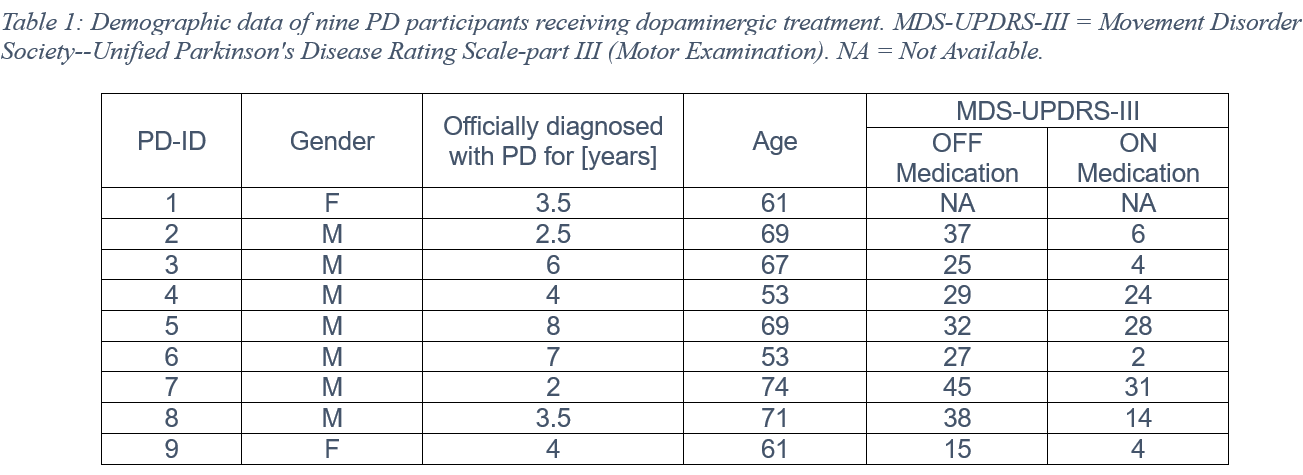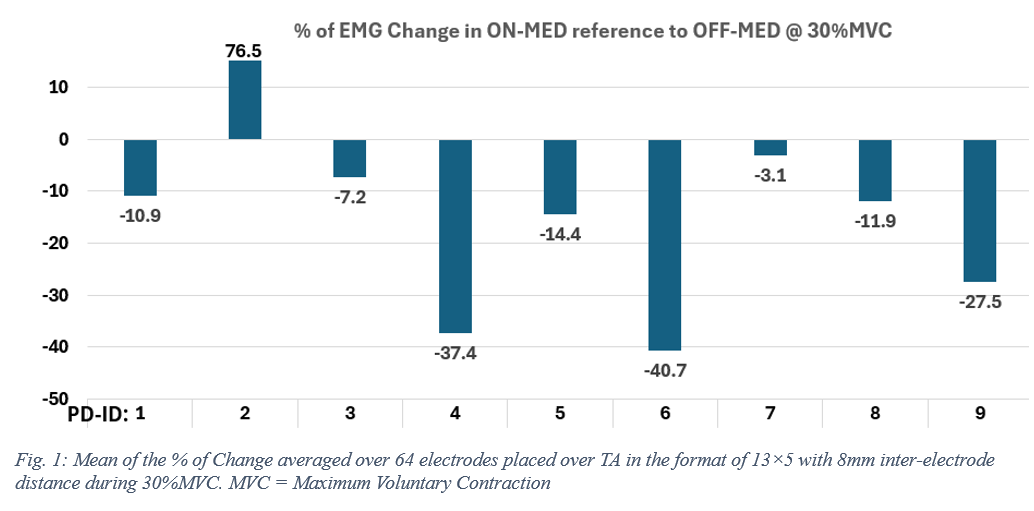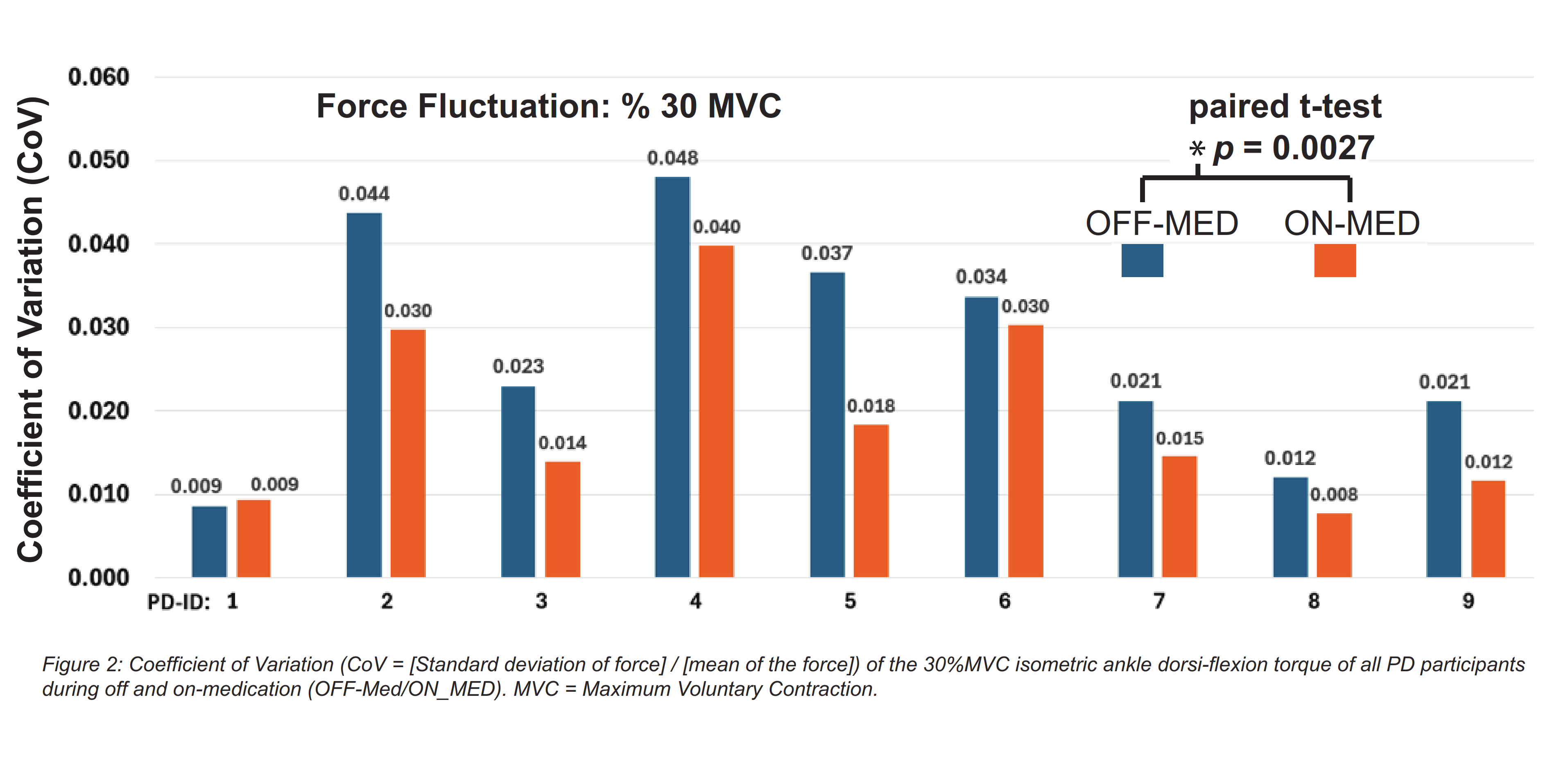Category: Parkinson's Disease: Neurophysiology
Objective: To quantify muscle activity changes in PD with dopaminergic medication.
Background: Parkinson’s disease (PD) is characterized by motor symptoms that improve with dopaminergic medication. We explored how PD medication affects muscle activity (EMG) during an isometric dorsiflexion task, hypothesizing that medication would stabilize contractions by reducing overall EMG amplitudes.
Method: We measured muscle activity in the tibialis anterior (TA) of 9 PD participants with diverse MDS-UPDRS-III scores (Table 1). Baseline measurements of maximum voluntary contraction (MVC) and dorsiflexion torque off-medication (OFF-MED) were compared to on-medication (ON-MED) states. EMG was assessed at sub-MVC levels (10%, 20%, 30%; three randomized trials per level) using a 64-electrode EMG grid during a one-minute trapezoidal torque profile (10s ramp up+40s plateau+10s ramp down). Assessments were repeated (matched OFF-MED MVC) 30-minutes after medication intake to account for the medication effect. The changes in muscle activity [%] were determined by the root mean square (RMS) of EMG during the plateau phase.
Results: The MDS-UPDRS-III significantly reduced (p=0.0007) in ON-MED state. PD participants exhibited varied muscle activity at 10% and 20% of MVC, with some participants increasing and others decreasing EMG amplitudes at these lower MVCs. The effect of the medication was more apparent at the moderate contraction level (30%MVC), as 8/9 participants showed a 3-68% decrease of EMG amplitude in ON-MED versus OFF-MED (Figure 1). Excluding the EMG data of PD-ID2 (potential outlier), the difference between OFF and ON-Med was significant (paired t-test: p=0.041). Also, PD medication significantly reduced the variation of generated dorsiflexion torque as measured using the coefficient of variation (CoV: p=0.0027; paired t-test; Figure 2). The reduced EMG amplitude and the smaller CoV suggest changes in motor unit recruitment and/or overall firing frequency after dopaminergic treatment.
Conclusion: Preliminary findings suggest that the impact of PD medication varies with contraction intensity, with more pronounced effects via reducing EMG amplitude and muscle force variation in tasks requiring moderate force levels. This research offers key insights into optimizing PD treatment by understanding medication effects on muscle control for tailoring therapeutic strategies to individual patient needs.
Table 1
Figure 1
Figure 2
To cite this abstract in AMA style:
B. Afsharipour, F. Roy, M. Schindle, F. Ba, M. Gorassini, T. Sankar. Maintaining Isometric Contraction in Parkinson’s Disease: Effect of PD-Medication on EMG Amplitude [abstract]. Mov Disord. 2024; 39 (suppl 1). https://www.mdsabstracts.org/abstract/maintaining-isometric-contraction-in-parkinsons-disease-effect-of-pd-medication-on-emg-amplitude/. Accessed February 19, 2026.« Back to 2024 International Congress
MDS Abstracts - https://www.mdsabstracts.org/abstract/maintaining-isometric-contraction-in-parkinsons-disease-effect-of-pd-medication-on-emg-amplitude/



